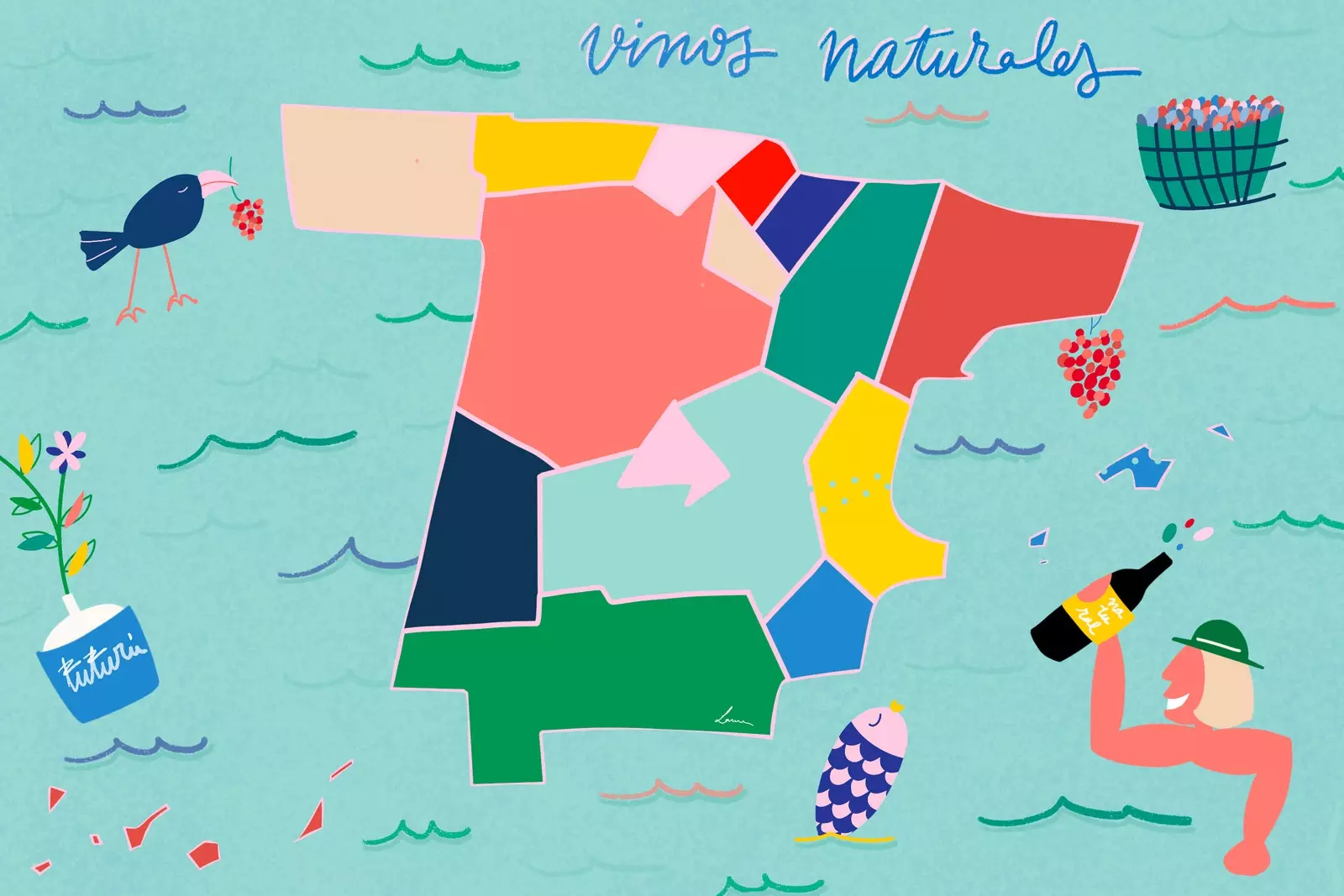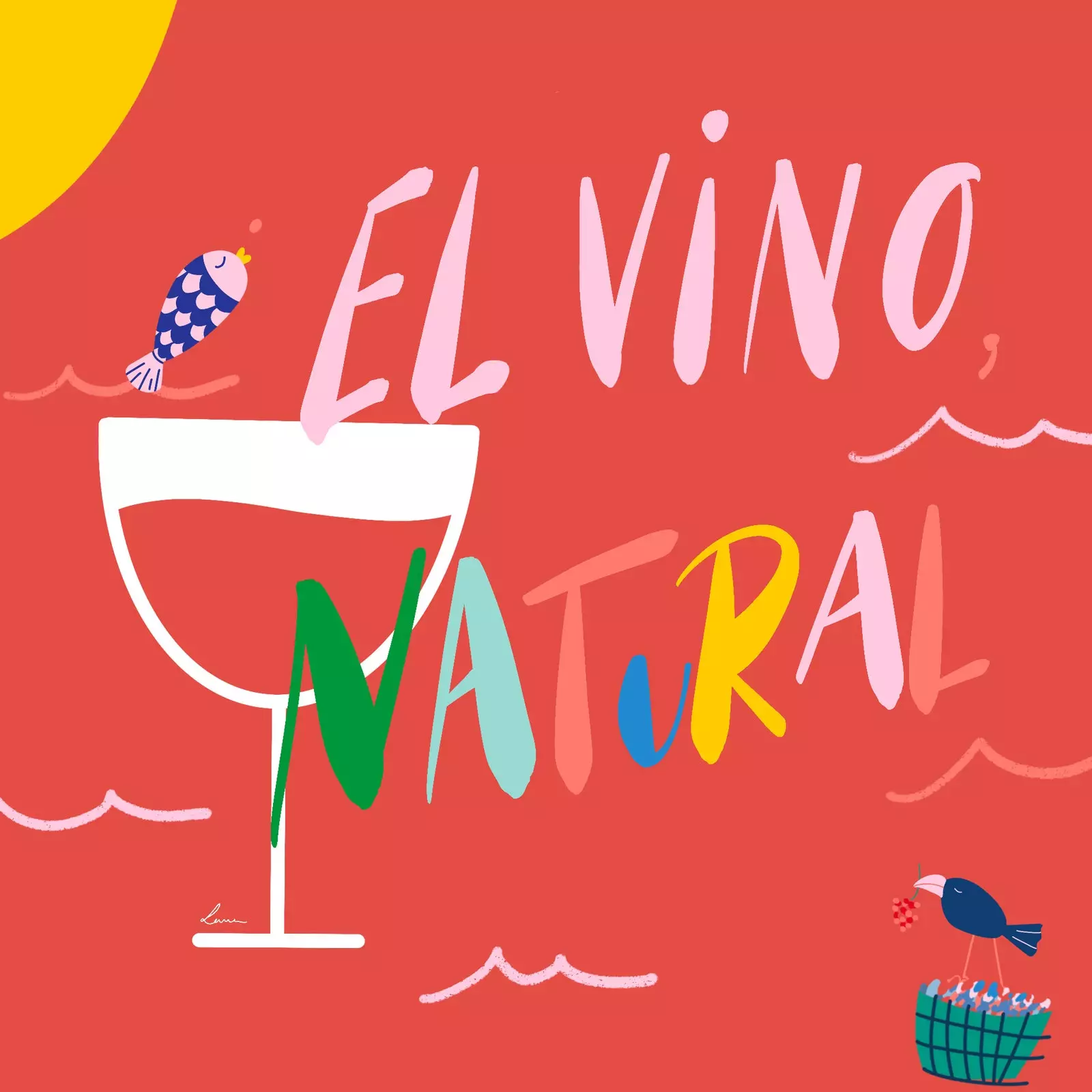
The map of natural wines
With natural wines (fermented grape juice: ball point) happens as with noble fabrics (cashmere, linen or mohair), specialty coffee or requited love: when you get into them you don't want anything else and what you thought you knew before turns out not to. And one door opens —that doesn't mean another one closes— and one day you realize that you can't (that you don't want to, rather) live without everything that this new stay in your life gives you: to me this It happens to me a lot (or rather, it's happening to me) with the disruptive ecosystem, integrating and very attached to the land of natural wines.
And it is that little by little this universe of unprejudiced winegrowers and wine bars, where the plan to have fun without snobbery, is conquering the little hearts of many (mine, to go no further) wine lovers a little up to their noses with so much engorgement and so much affectation.
Ismael Gozalo, with Brutal Microbe; Laura Lawrence, from Daterra Viticulturists; Clos Lenticus, Manel and Joan Avinyó in the Garraf Natural Park; either UBE Miraflores, by Ramiro Ibanez for Bodegas Cota. Joy, self-confidence, good vibes and zero nonsense —these wine freaks remind me a little of what C.Tangana and Santos Bacana are doing with the audiovisual narrative of an entire industry. simply, they are building from an absolutely free place. And that shows.
The one that the futurists led by Filippo Tommaso Marinetti concocted also comes to mind, "We want to sing the love of danger, the habit of energy and recklessness." Let the museums go up in flames (the mammoth cellars, in this case), the rancid ancestry and the imposture of the sommelier with his 60-buck glasses and his decanters: Drink to the nose! Rock'n'Roll! Less saving and more dancing!
I don't like to use the movement concept lightly, but of course this one has all the traces of it: there is community, there are unshakable principles on which to walk and that unappealable sensation of change floats in the air, of revolution!

"Natural wine has no additives, it is one that ferments spontaneously, without the need for fictitious aid"
Principles and community. What are those principles? “Natural wine has no additives, it is one that ferments spontaneously, without the need for fictitious aid. Inert and deceitful remedies, based on the addition of chemical substances in order to achieve clean and perfect wines: dead. Natural wine should be the result of the land and the plants, of the roots that penetrate incessantly seeking their own food and future, their quixotic balance” , who speaks is Fernando Angulo, from Alba Viticultores: farmer, Quixote and poet.
“The first and vital premise of one who makes wine should be humility, for that reason of time, of the eternal slowness, of the reflective pause; so many times it is better not to invent anything than to do it, wait for nature, listen to the vineyard”. Waiting for nature, how nice, right? “The second is respect for the origin, for history and for oneself. The natural, the simple, the simple, the ancestral: all this will prevail. So they did and so they will. We are trivial passengers in a story created since the Egyptians, already natural drinkers”.
All revolutions, deep down, hide a sacred principle: we have forgotten why we did things. We have forgotten what art was (in terms of the futurists) and the world of wine has forgotten why we love wine, it has failed in its sacred pact with the winegrower and nature.
As for the community, one of the best things that has happened to us is discovering the Raisin project, an application that geolocates interesting projects (both wineries and wine bars) all over the planet. No scores or milk, just projects with soul. “Our mission is simple: Raisin wants the world to discover natural wine. We love it for its flavor (because it tastes like the truth), but what we deeply appreciate is your respect for the terroir, the environment and the people behind it. In addition, we have found that natural wine is almost always a key indicator of where to find local and seasonal, ecological, quality and responsible products that are addressed to a growing number of consumers, who want good wine and food without chemicals”.
And how exactly does it work? How do you choose who and why? “As natural wine is not a label or a certification, finding such a unique product that meets the essential requirements is a struggle, it is our fight on a day-to-day basis; at Raisin we scrupulously follow the criteria of the Association of Natural Wine’s (Cahier des charges - AVN) and what we ask a winery to be in is that at least 50% of its production be natural”. And so, slowly and with good lyrics, they have reached the dizzying figure of 4,500 wine bars and 1,700 wineries around the world.
Talked with Jean-Hugues Bretin (founder of the invention) regarding the role that the Spanish market plays in all this... How are we doing? “The Iberian Peninsula is definitely gaining ground (yes, far from the numbers of France, Italy or Belgium). Currently, there are 72 wineries and 170 bars, restaurants and wine shops: interestingly, Barcelona has almost half, 49 establishments; Madrid only has 13 and Lisbon, 18. One thing is certain: change is on the way”.
Miguel Delibes wrote that a people without literature is a mute people, but I think we can extend it to the vineyards, our winegrowers and our (natural) wine. A town without wine is a silent town and if at any time it has become necessary (urgently) to look towards sustainability and a more natural way of living and consuming, it is precisely now. Long live the wine!
